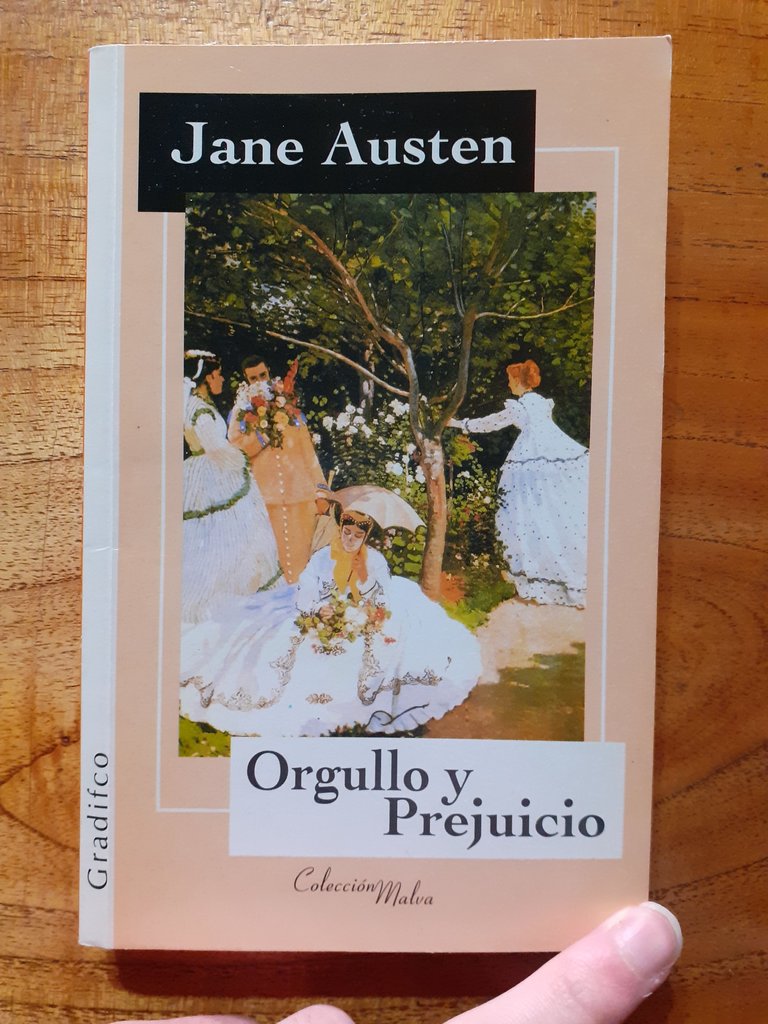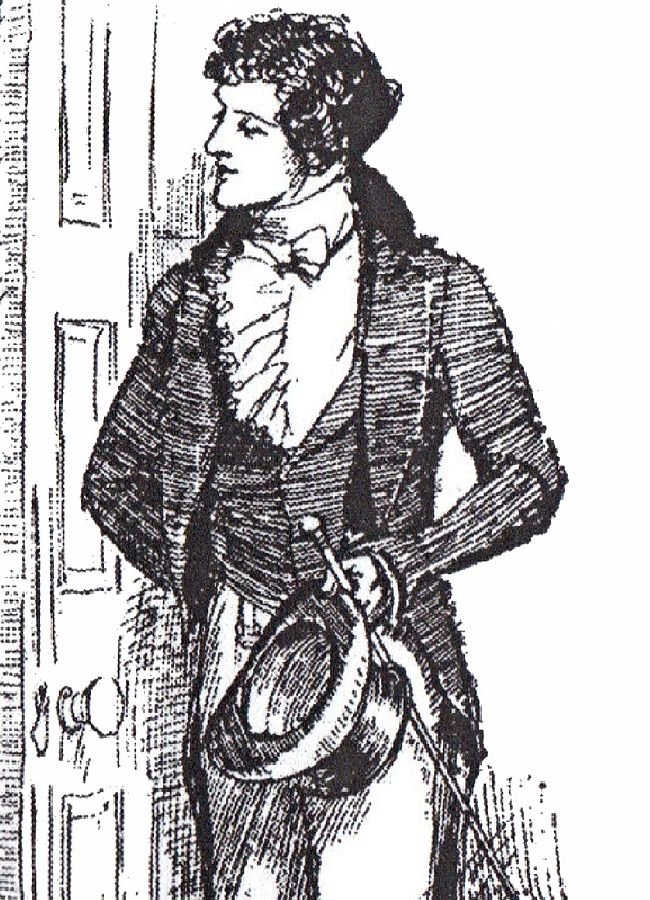
Foto propia. Portada: Mujeres en el jardín, por Monet
Esta comedia romántica por Jane Austen trata principalmente de la relación entre Elizabeth Bennet y el señor Darcy (su primer nombre casi nunca se menciona), y no es una obra con amor a primera vista sino una donde el amor se va desarrollando gradualmente y ambos protagonistas cambian como consecuencia.
Si esta novela hubiera sido escrita por un escritor del presente, probablemente habría tenido una reconstrucción de época, con muchas descripciones de ropas, los lugares, contexto histórico… Pero Jane Austen no hizo tal cosa gracias a que la puso en su propia época, y la falta de esas descripciones no hace mella en los lectores del presente para el disfrute de la historia.
También avanza rápido gracias a que, aunque hay mucho diálogo, buena parte de ellos no se cuenta dialógicamente sino que se describe, y aunque hay un par de escenas que me habría gustado que estuvieran dialogadas en vez de descriptas, el efecto global es muy bueno para la fluidez (en especial, solamente se describen la mayor parte de las fórmulas o partes de diálogo de cortesía, que sería lo más pesado y vacío de leer).

https://commons.wikimedia.org/wiki/File:Thompson-Darcy.jpg
Mientras que a Lizzie la noté prácticamente igual que en la película de 2005, excepto quizá por que a la Lizzie de Keira Knightly la sentí un poquito más vivaz o enérgica, aunque ese podría ser sólo el efecto de lo visual. Pero el señor Darcy sí es distinto de un modo importante: en la película tiene más peso para que sea como es que es introvertido y además tímido con las personas que no conoce; en la novela, en cambio, aunque también tiene esas características, sí tiene más peso su orgullo y autopercepción de estatus para por qué actúa como lo hace, y después del rechazo de
Elizabeth considera profundamente su actitud y por eso termina cambiando, mientras que en la película no hay tanto cambio sino más bien una revelación gradual de que el carácter de Darcy no era el aparente primero; es más originalmente virtuoso en ese sentido el Darcy de película envez de novela.
El otro personaje con cambio importante es el del padre de Lizzie, el señor Bennet, quien es peor esposo, más ácido, y más desentendido de la crianza de sus hijas en el libro, pero también él, similarmente a Darcy, reconoce sus errores, en su caso tras la fuga de Lydia, y decide poner más empeño en la educación de Kitty.
Como último comentario: este libro me hizo caer como hacía tiempo no me pasaba en la trampa del “leo un capítulo más y me duermo” para terminar leyendo muchos capítulos.
This romantic comedy by Jane Austen is mainly about the relationship between Elizabeth Bennet and Mr. Darcy (her first name is almost never mentioned), and it is not a work with love at first sight but one where love develops gradually and both protagonists change as a consequence.
If this novel had been written by a present day writer, it probably would have had a period reconstruction, with many descriptions of clothes, the places, historical context... But Jane Austen did no such thing thanks to setting it in her own time, and the lack of those descriptions does not dent present day readers' enjoyment of the story.
It also moves along quickly thanks to the fact that, while there is a lot of dialogue, much of it is not told dialogically but described, and while there are a couple of scenes that I would have liked to have been dialogued rather than described, the overall effect is very good for story flowing (in particular, most of the formulaic or polite parts of dialogue are merely described and not written down in dialogue, which would be the heaviest and emptiest to read).
Whereas I noticed Lizzie to be pretty much the same as in the 2005 film, except maybe that Keira Knightly's Lizzie felt a tad more vivacious or energetic, though that could just be the effect of the seeing in a movie instead of in the imagination. But Mr. Darcy is different in an important way: in the film it has more weight for him to be the way he is that he is quite introverted and also shy with people he does not know; in the novel, on the other hand, although he also has those characteristics, it has more weight his pride and self-perception of status for why he acts as he does, and after Elizabeth's rejection he deeply considers his attitude and so ends up changing, while in the film there is not so much change but rather a gradual revelation that Darcy's character was not the apparent first; is more originally virtuous in that sense the Darcy of the film instead of the novel.
The other character with major change is Lizzie's father, Mr. Bennet, who is a worse husband, more acidic, and more disengaged from his daughters' upbringing in the book, but he too, similar to Darcy, recognizes his mistakes, in his case after Lydia's elopement, and decides to put more effort into Kitty's education.
As a final comment: this book made me fall into the trap of "I'll read one more chapter and I'll go to sleep" and ending up reading many chapters, as I haven't done in a long time.
The rewards earned on this comment will go directly to the people( @santiago-yocoy ) sharing the post on Twitter as long as they are registered with @poshtoken. Sign up at https://hiveposh.com.
¡Hola! Siempre me ha parecido interesante tanto el libro como la película pero nunca me tomé el tiempo de ver o leerlo porque sentía que necesitaba mucha atención o que sería difícil de agarrarle el gusto. Tengo ambas cosas a mi disposición y aún no me animo completamente, ¿crees que debería leer primero el libro y luego la película? Acostumbro a hacer eso, pero no sé qué tanto afecte mi percepción después, o si podría olvidar completamente una de esas dos opciones, ¿qué me recomiendas? Me gustó el tema de tu post, lo necesitaba para decidirme, hahaha ¡saludos!
Hola, a mí me pasó que me había topado por casualidad en la tele con la película en un par de escenas muy buenas y entonces decidí verla entera. Siempre es difícil decidir si ver primero la película y después leer el libro o viceversa, pero en este caso estoy muy contento con lo que hice yo, aprehender la historia en ese orden de película-libro; y apenas terminé el libro volví a ver la película, y la disfruté igual que antes